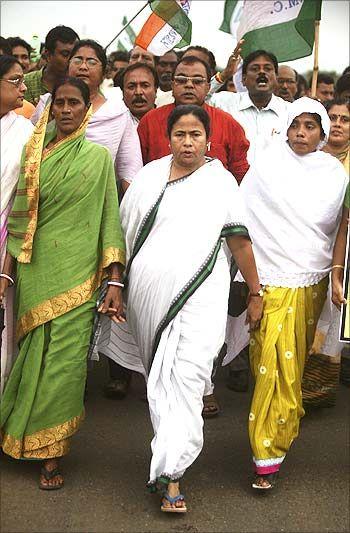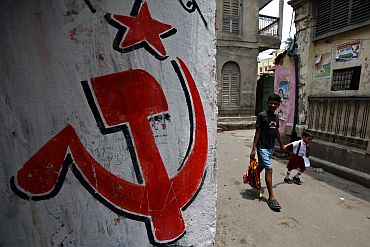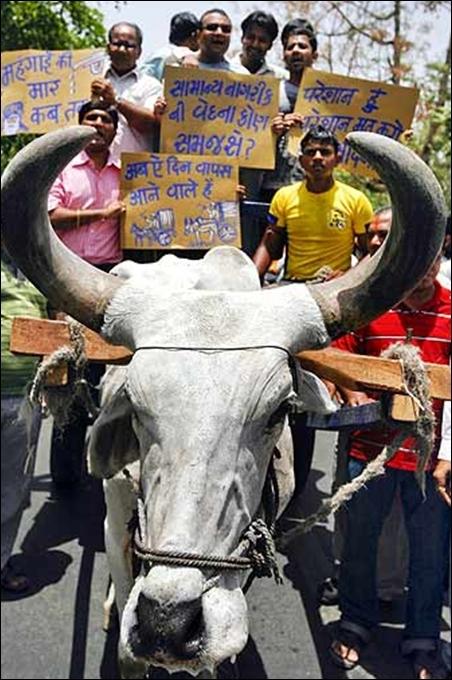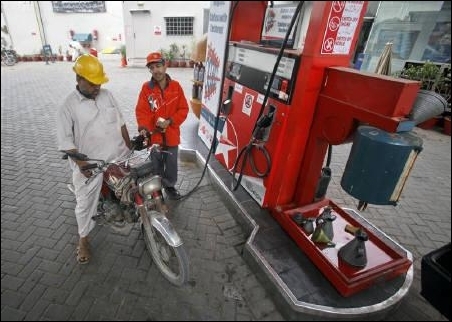 | « Back to article | Print this article |
Mamata must learn the limits of populism
West Bengal Chief Minister Mamata Banerjee may have begun to discover the difference between being a populist, street-level crusader and a political leader who is required to behave responsibly.
Her decision to defer exiting the United Progressive Alliance in protest against the latest petrol price rise suggests a belated understanding of power politics.
After all, there is little to gain from biting the central hand she needs to fund her bankrupt state government.
No doubt Finance Minister Pranab Mukherjee's gentle reminder that she did not oppose the Cabinet's June decision to decontrol fuel prices also encouraged her to soften her opposition.
Click NEXT to read further. . .
Mamata must learn the limits of populism
The prospect of losing a portfolio as powerful and lucrative as the Railways, now headed by a Trinamool MP, must have also weakened her compulsions to exit.
It's a future fuel price rise that will trigger the exit of her 19 MPs from the coalition, she now threatens, but in politics even a day is a long time, let alone the future
In any case, as a chief minister who demanded a Rs 47,000-crore (Rs 470-billion) bailout package from the Centre when she took over and is awaiting a Rs 21,614-crore (Rs 216.14-billion) handout that was announced in August, Ms Banerjee must be well aware that the Centre can scarcely afford to pay the oil marketing firms a hefty estimated Rs 1,21,000-crore (Rs 1,210-billion) subsidy this year.
Click NEXT to read further. . .
Mamata must learn the limits of populism
Ironically, this subsidy, a 55 per cent increase over Rs 78,000 crore (Rs 780 billion) last year, endures because state-owned oil companies are still required to sell diesel, kerosene and liquefied petroleum gas below cost (they incur losses of Rs 8.50 a litre on diesel, Rs 25.66 a litre on kerosene and Rs 260 per cylinder on LPG).
Ms Banerjee, who has worked strenuously at being more leftist than the leftists she defeated in state elections, must also surely appreciate the restraint displayed by the oil marketing companies in raising prices of a fuel mainly consumed by the relatively better off in India.
Indeed, despite subsidies, these companies continue to collectively bear losses of Rs 319 crore (Rs 3.19 billion) a day in the cause of 'the aam aadmi' she aims to serve.
But even before Mr Mukherjee's revelation, her opposition to the current price rise is hard to understand.
Click NEXT to read further. . .
Mamata must learn the limits of populism
It does not require complex math to know that crude oil prices have been rising steadily over the year -- they have stayed above the $100 a barrel market since February -- and now hover at $115 a barrel.
Given that India imports over 70 per cent of its crude oil requirements and the rupee has weakened almost 10 per cent against the dollar, it is inconceivable for consumers of fuel products not to pay higher prices.
Further, it must have escaped Ms Banerjee's notice that the solution to partially alleviating the suffering of the people on account of the fuel price rise lies in her hands, another point Mr Mukherjee adroitly highlighted.
Click NEXT to read further. . .
Mamata must learn the limits of populism
The states charge local taxes that account for 15 to 30 per cent of the price of petrol and diesel.
For West Bengal, local imposts make up as much as 25 per cent of the final price.
Should Ms Banerjee feel so deeply about the burdens imposed on the people in her state, the remedy lies in sacrificing revenues accruing to Writers' Building and waiving these imposts.
In doing so, she can draw on the precedent set by other women leaders.
Uttar Pradesh Chief Minister Mayawati lowered the VAT on diesel and scrapped the tax on LPG in 2008.
Sheila Dixit also lowered local imposts. Or perhaps Ms Banerjee can spend some time absorbing the lesson that politics is not just about confrontation at the hustings but tough compromises when in power.





